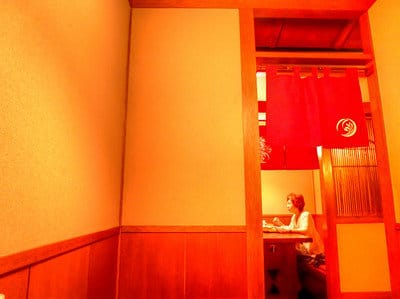
What most of us look for when visiting a new place is a local, authentic experience that feels like we’re the first outsider to discover. The best place to find this intersection of culinary culture is to ask a few locals, “where do you eat?” In Tokyo, that’s exactly what I did, which lead me to Rangetsu to try sukiyaki – and you should too.
Misleading Exterior
The polished but humble entrance to Rangetsu is almost too fancy; the kind of decor that leads one to believe you’re paying more for ambiance than good food. But a few steps into the tight hallways of Rangetsu hits you immediately with the sense you’re entering somewhere special. The waiter, in suit and tie, asks for your order – sukiyaki of course – and seats you in a tiny room, sharply closing the curtain behind him.
Contemplating Sukiyaki
Sukiyaki, a lesser know Japanese dish, is a meal of vegetables, noodles, and thinly sliced beef mixed with raw egg served in generally that order. Typically sukiyaki is a winter meal, but Rangetsu serves sukiyaki year-round. Once the curtain has been closed, the silence of your contemplation will be broken by the clicks of the curtain rings as they’re pulled open again. This time, a woman wearing traditional Japanese attire with under heavy makeup takes your drink order, then promptly leaves.

Your drinks arrive, food order given, and there you are again. Piece by piece, moment by moment, sip by sip, the meal at Rangetsu is reflective of the general Japanese dining experience. Colorful, coordinated, proportional and very much in moderation.
Hot Potting
Every time the waitress comes into your little room, something is cooked in front of you in a small hot pot. The noodles are one course, as is the soup, then vegetables, finally beef with raw egg. Everything is tasty. The kind of quality that makes you notice things like the flavor of individual green beans you normally wouldn’t on most plates. Portions are just enough food to be satisfying leaving ample room for respectable amounts of saki.
The dining culture in Japan is certainly quality over quantity over time and Rangetsu is the manifestation of it all.

Prices at Rangestu aren’t as high as most places in Ginza, Tokyo’s version of Time Square, but not cheap either. (Despite Tokyo dropping out of the top 10 most expensive cities last year.) A sukiyaki dinner, the full experience, is around $75 but only half that at lunch time.
Sukiyaki at Rangetsu is an event – vaguely like ordering a lomito in Santiago or drinking raki like a Turk – where the meal itself is an ingredient of conversation, reflection, and enjoyment. Not something to be rushed or overlooked, after a warm sukiyaki then final sip of tea, in the future you might occasionally take a slower bite at your next lunch. Try to feel the flavors as they’re absorbed by different parts of your tongue. Appreciate the next cup of coffee on your way to work or otherwise find the peaceful moment that lies in every food, one of several lessons the sukiyaki at Rangetsu hopefully leaves you with.












